Food Insecurity Proposal: Asylum Seekers in Melbourne, Australia
VerifiedAdded on 2022/11/26
|10
|2391
|204
Report
AI Summary
This report delves into the critical issue of food insecurity, specifically focusing on asylum seekers residing in Melbourne, Australia. The introduction highlights the importance of nutrition and the challenges faced by this vulnerable population due to limited employment, financial support, and access to social services. The report examines the prevalence of food insecurity in Australia, citing recent surveys and studies that reveal concerning rates among asylum seekers and economically disadvantaged groups. It then explores the various causes of food insecurity, including work restrictions, low incomes, and limited government support, which are compounded by the high cost of nutritious foods and geographical isolation. The consequences of food insecurity are discussed, emphasizing the negative impacts on health, nutrition, and mental well-being. The report proposes a human rights-based approach to address food insecurity, advocating for equal rights, freedom of expression, and participation in decision-making processes. It highlights the strengths, evidence, and acceptability of this approach, emphasizing the need for better housing, equal opportunities, and government support. The report also acknowledges weaknesses such as climate change, urbanization and emergencies. Finally, the conclusion reiterates the significance of food security and the importance of adopting effective strategies to protect the rights and improve the lives of vulnerable groups like asylum seekers, calling for policy changes and sustainable campaigns to promote food security.
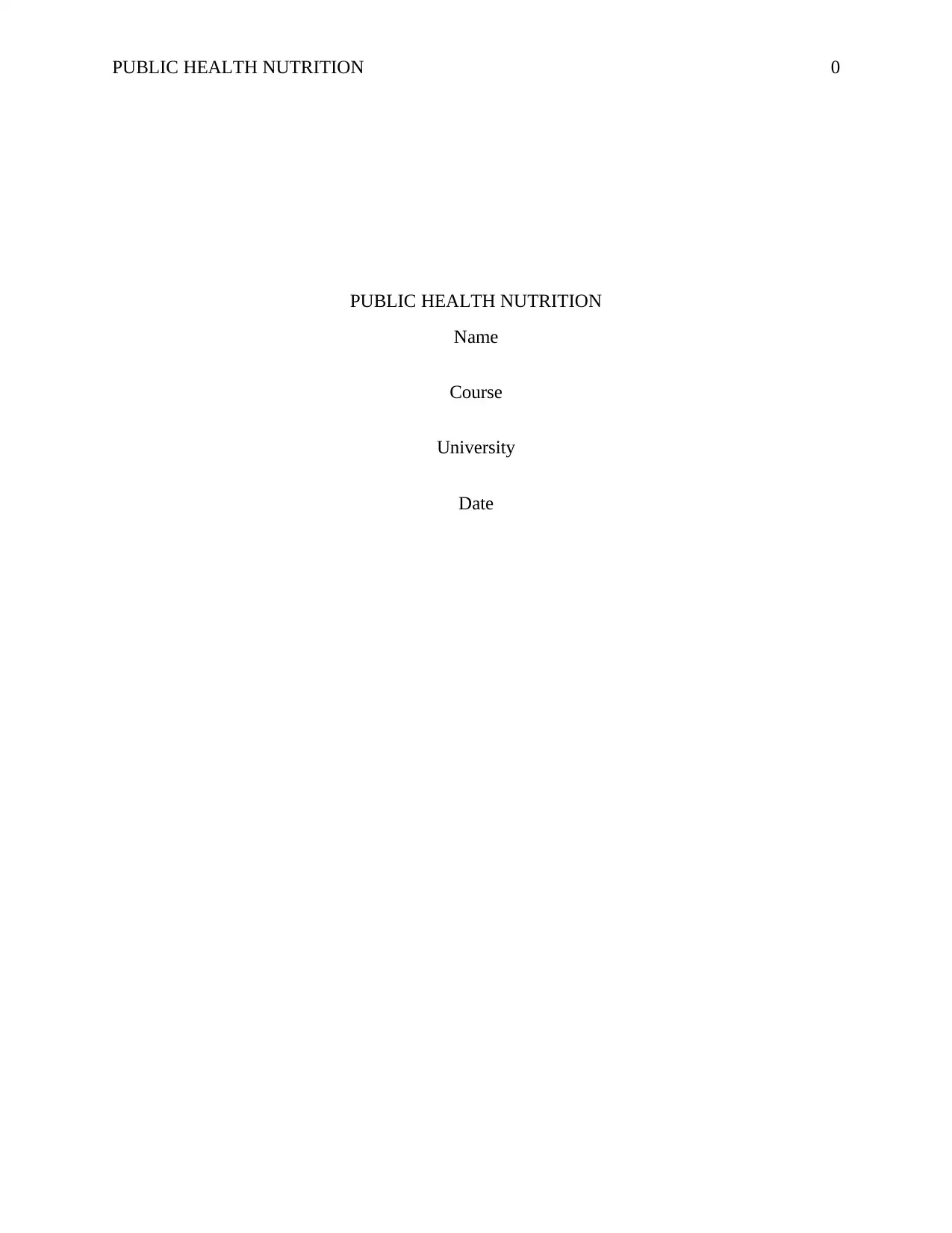
PUBLIC HEALTH NUTRITION 0
PUBLIC HEALTH NUTRITION
Name
Course
University
Date
PUBLIC HEALTH NUTRITION
Name
Course
University
Date
Paraphrase This Document
Need a fresh take? Get an instant paraphrase of this document with our AI Paraphraser
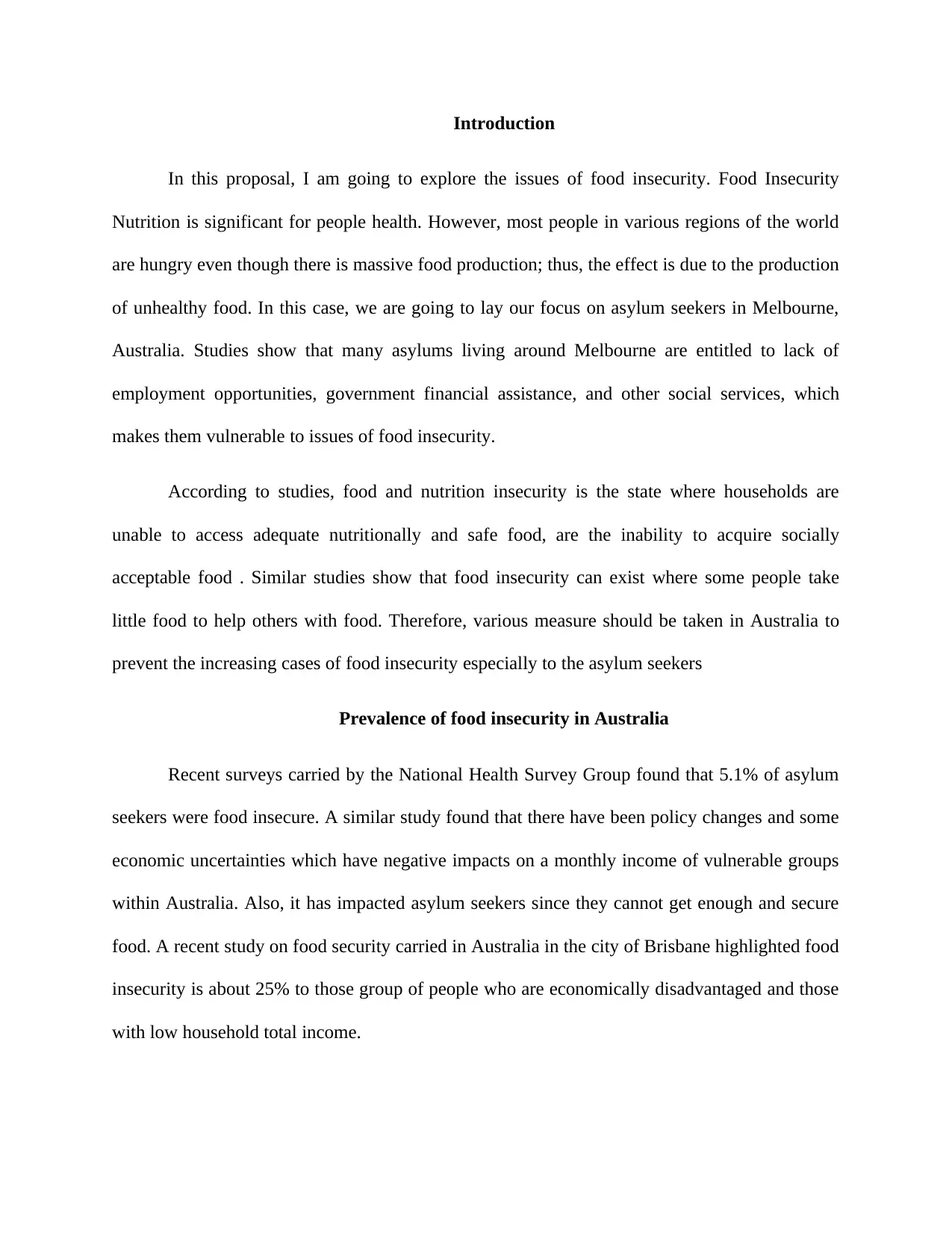
Introduction
In this proposal, I am going to explore the issues of food insecurity. Food Insecurity
Nutrition is significant for people health. However, most people in various regions of the world
are hungry even though there is massive food production; thus, the effect is due to the production
of unhealthy food. In this case, we are going to lay our focus on asylum seekers in Melbourne,
Australia. Studies show that many asylums living around Melbourne are entitled to lack of
employment opportunities, government financial assistance, and other social services, which
makes them vulnerable to issues of food insecurity.
According to studies, food and nutrition insecurity is the state where households are
unable to access adequate nutritionally and safe food, are the inability to acquire socially
acceptable food . Similar studies show that food insecurity can exist where some people take
little food to help others with food. Therefore, various measure should be taken in Australia to
prevent the increasing cases of food insecurity especially to the asylum seekers
Prevalence of food insecurity in Australia
Recent surveys carried by the National Health Survey Group found that 5.1% of asylum
seekers were food insecure. A similar study found that there have been policy changes and some
economic uncertainties which have negative impacts on a monthly income of vulnerable groups
within Australia. Also, it has impacted asylum seekers since they cannot get enough and secure
food. A recent study on food security carried in Australia in the city of Brisbane highlighted food
insecurity is about 25% to those group of people who are economically disadvantaged and those
with low household total income.
In this proposal, I am going to explore the issues of food insecurity. Food Insecurity
Nutrition is significant for people health. However, most people in various regions of the world
are hungry even though there is massive food production; thus, the effect is due to the production
of unhealthy food. In this case, we are going to lay our focus on asylum seekers in Melbourne,
Australia. Studies show that many asylums living around Melbourne are entitled to lack of
employment opportunities, government financial assistance, and other social services, which
makes them vulnerable to issues of food insecurity.
According to studies, food and nutrition insecurity is the state where households are
unable to access adequate nutritionally and safe food, are the inability to acquire socially
acceptable food . Similar studies show that food insecurity can exist where some people take
little food to help others with food. Therefore, various measure should be taken in Australia to
prevent the increasing cases of food insecurity especially to the asylum seekers
Prevalence of food insecurity in Australia
Recent surveys carried by the National Health Survey Group found that 5.1% of asylum
seekers were food insecure. A similar study found that there have been policy changes and some
economic uncertainties which have negative impacts on a monthly income of vulnerable groups
within Australia. Also, it has impacted asylum seekers since they cannot get enough and secure
food. A recent study on food security carried in Australia in the city of Brisbane highlighted food
insecurity is about 25% to those group of people who are economically disadvantaged and those
with low household total income.
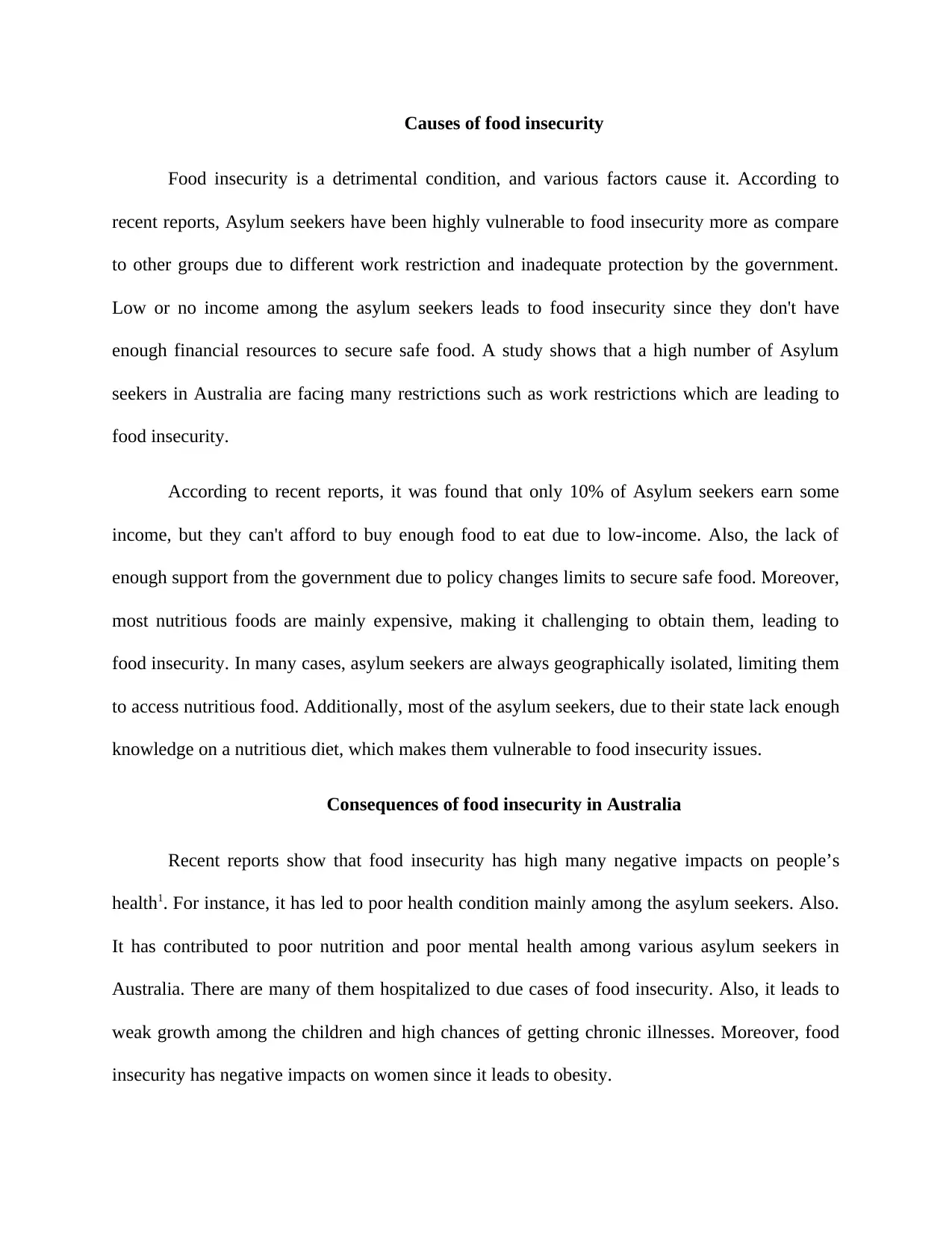
Causes of food insecurity
Food insecurity is a detrimental condition, and various factors cause it. According to
recent reports, Asylum seekers have been highly vulnerable to food insecurity more as compare
to other groups due to different work restriction and inadequate protection by the government.
Low or no income among the asylum seekers leads to food insecurity since they don't have
enough financial resources to secure safe food. A study shows that a high number of Asylum
seekers in Australia are facing many restrictions such as work restrictions which are leading to
food insecurity.
According to recent reports, it was found that only 10% of Asylum seekers earn some
income, but they can't afford to buy enough food to eat due to low-income. Also, the lack of
enough support from the government due to policy changes limits to secure safe food. Moreover,
most nutritious foods are mainly expensive, making it challenging to obtain them, leading to
food insecurity. In many cases, asylum seekers are always geographically isolated, limiting them
to access nutritious food. Additionally, most of the asylum seekers, due to their state lack enough
knowledge on a nutritious diet, which makes them vulnerable to food insecurity issues.
Consequences of food insecurity in Australia
Recent reports show that food insecurity has high many negative impacts on people’s
health1. For instance, it has led to poor health condition mainly among the asylum seekers. Also.
It has contributed to poor nutrition and poor mental health among various asylum seekers in
Australia. There are many of them hospitalized to due cases of food insecurity. Also, it leads to
weak growth among the children and high chances of getting chronic illnesses. Moreover, food
insecurity has negative impacts on women since it leads to obesity.
Food insecurity is a detrimental condition, and various factors cause it. According to
recent reports, Asylum seekers have been highly vulnerable to food insecurity more as compare
to other groups due to different work restriction and inadequate protection by the government.
Low or no income among the asylum seekers leads to food insecurity since they don't have
enough financial resources to secure safe food. A study shows that a high number of Asylum
seekers in Australia are facing many restrictions such as work restrictions which are leading to
food insecurity.
According to recent reports, it was found that only 10% of Asylum seekers earn some
income, but they can't afford to buy enough food to eat due to low-income. Also, the lack of
enough support from the government due to policy changes limits to secure safe food. Moreover,
most nutritious foods are mainly expensive, making it challenging to obtain them, leading to
food insecurity. In many cases, asylum seekers are always geographically isolated, limiting them
to access nutritious food. Additionally, most of the asylum seekers, due to their state lack enough
knowledge on a nutritious diet, which makes them vulnerable to food insecurity issues.
Consequences of food insecurity in Australia
Recent reports show that food insecurity has high many negative impacts on people’s
health1. For instance, it has led to poor health condition mainly among the asylum seekers. Also.
It has contributed to poor nutrition and poor mental health among various asylum seekers in
Australia. There are many of them hospitalized to due cases of food insecurity. Also, it leads to
weak growth among the children and high chances of getting chronic illnesses. Moreover, food
insecurity has negative impacts on women since it leads to obesity.
⊘ This is a preview!⊘
Do you want full access?
Subscribe today to unlock all pages.

Trusted by 1+ million students worldwide
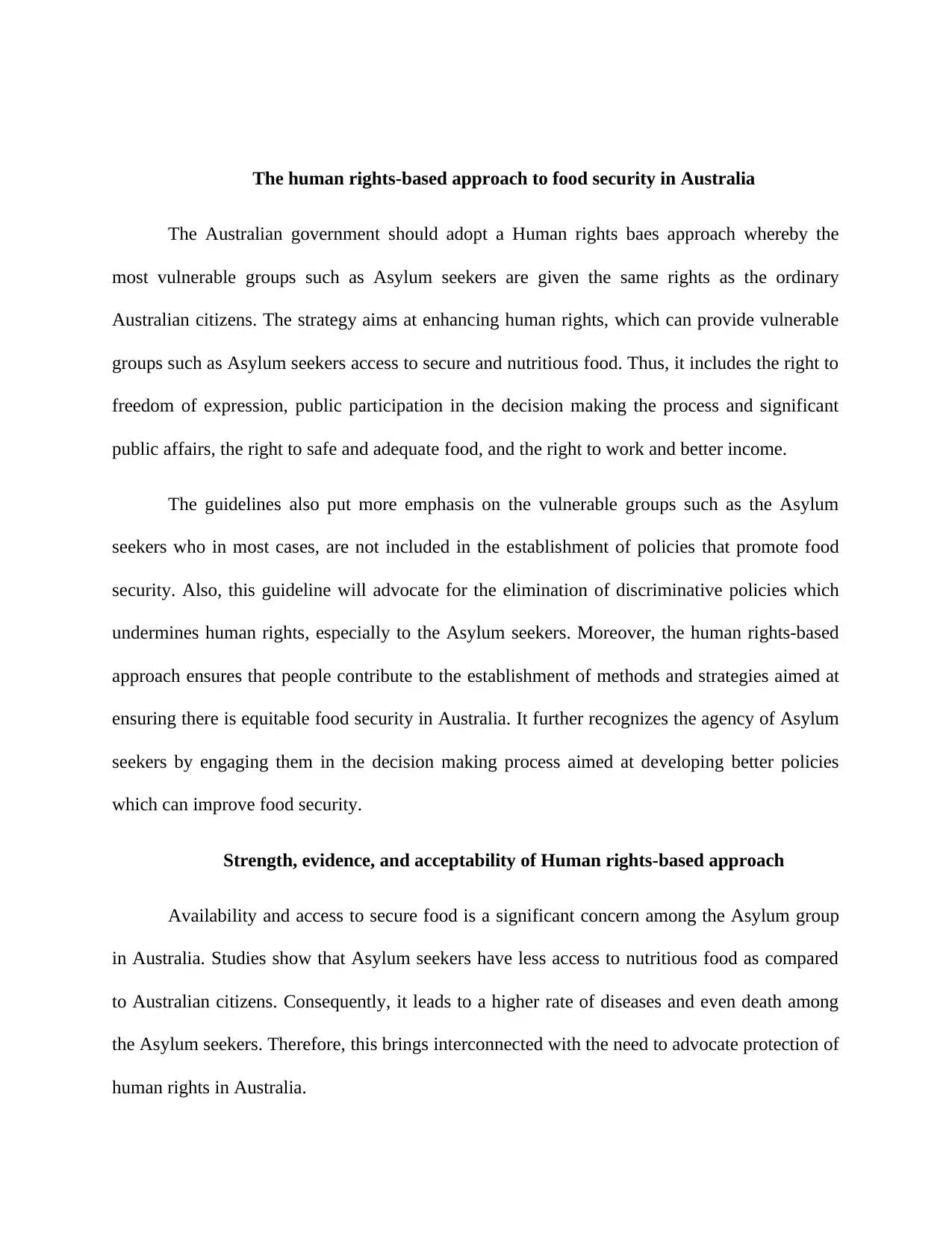
The human rights-based approach to food security in Australia
The Australian government should adopt a Human rights baes approach whereby the
most vulnerable groups such as Asylum seekers are given the same rights as the ordinary
Australian citizens. The strategy aims at enhancing human rights, which can provide vulnerable
groups such as Asylum seekers access to secure and nutritious food. Thus, it includes the right to
freedom of expression, public participation in the decision making the process and significant
public affairs, the right to safe and adequate food, and the right to work and better income.
The guidelines also put more emphasis on the vulnerable groups such as the Asylum
seekers who in most cases, are not included in the establishment of policies that promote food
security. Also, this guideline will advocate for the elimination of discriminative policies which
undermines human rights, especially to the Asylum seekers. Moreover, the human rights-based
approach ensures that people contribute to the establishment of methods and strategies aimed at
ensuring there is equitable food security in Australia. It further recognizes the agency of Asylum
seekers by engaging them in the decision making process aimed at developing better policies
which can improve food security.
Strength, evidence, and acceptability of Human rights-based approach
Availability and access to secure food is a significant concern among the Asylum group
in Australia. Studies show that Asylum seekers have less access to nutritious food as compared
to Australian citizens. Consequently, it leads to a higher rate of diseases and even death among
the Asylum seekers. Therefore, this brings interconnected with the need to advocate protection of
human rights in Australia.
The Australian government should adopt a Human rights baes approach whereby the
most vulnerable groups such as Asylum seekers are given the same rights as the ordinary
Australian citizens. The strategy aims at enhancing human rights, which can provide vulnerable
groups such as Asylum seekers access to secure and nutritious food. Thus, it includes the right to
freedom of expression, public participation in the decision making the process and significant
public affairs, the right to safe and adequate food, and the right to work and better income.
The guidelines also put more emphasis on the vulnerable groups such as the Asylum
seekers who in most cases, are not included in the establishment of policies that promote food
security. Also, this guideline will advocate for the elimination of discriminative policies which
undermines human rights, especially to the Asylum seekers. Moreover, the human rights-based
approach ensures that people contribute to the establishment of methods and strategies aimed at
ensuring there is equitable food security in Australia. It further recognizes the agency of Asylum
seekers by engaging them in the decision making process aimed at developing better policies
which can improve food security.
Strength, evidence, and acceptability of Human rights-based approach
Availability and access to secure food is a significant concern among the Asylum group
in Australia. Studies show that Asylum seekers have less access to nutritious food as compared
to Australian citizens. Consequently, it leads to a higher rate of diseases and even death among
the Asylum seekers. Therefore, this brings interconnected with the need to advocate protection of
human rights in Australia.
Paraphrase This Document
Need a fresh take? Get an instant paraphrase of this document with our AI Paraphraser
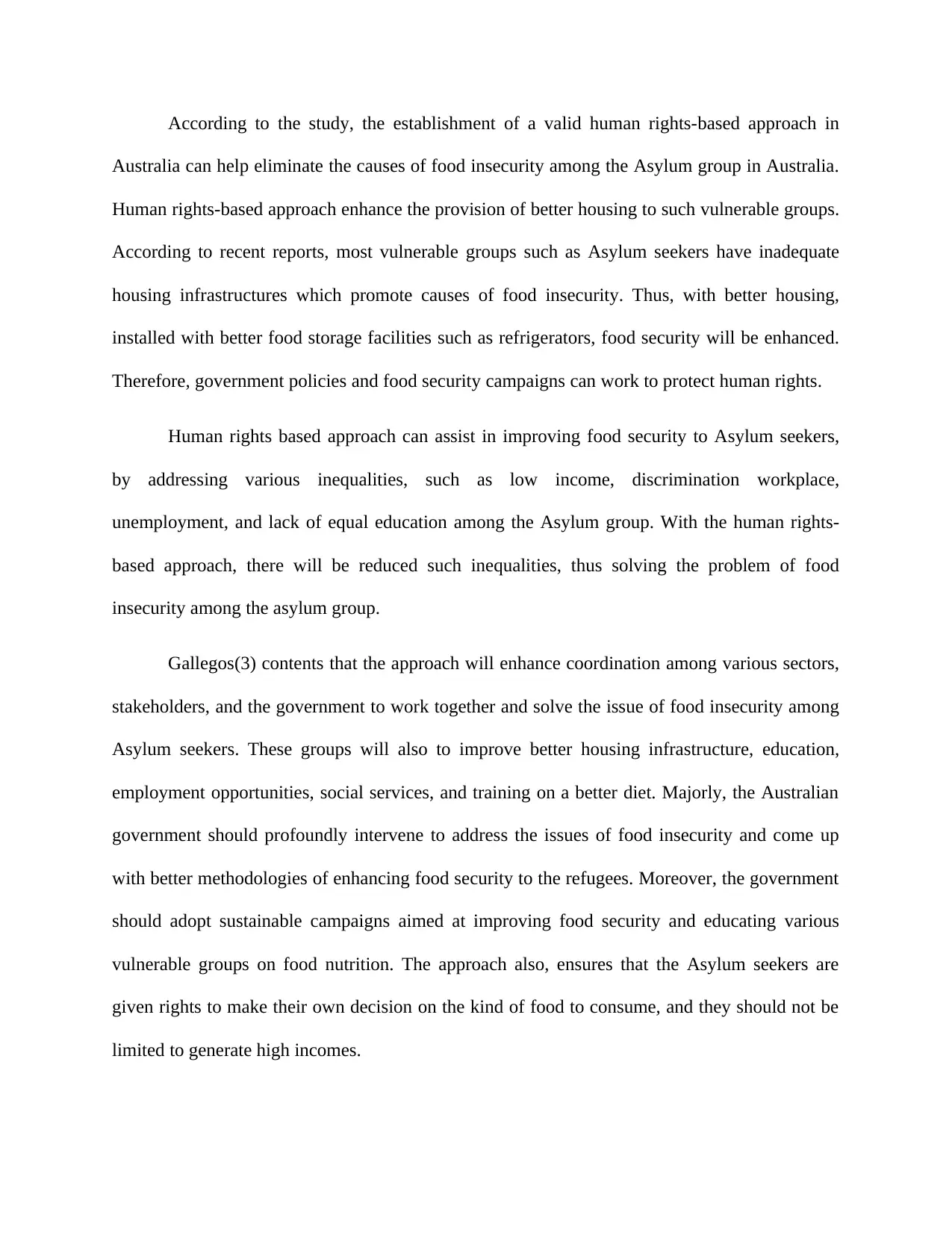
According to the study, the establishment of a valid human rights-based approach in
Australia can help eliminate the causes of food insecurity among the Asylum group in Australia.
Human rights-based approach enhance the provision of better housing to such vulnerable groups.
According to recent reports, most vulnerable groups such as Asylum seekers have inadequate
housing infrastructures which promote causes of food insecurity. Thus, with better housing,
installed with better food storage facilities such as refrigerators, food security will be enhanced.
Therefore, government policies and food security campaigns can work to protect human rights.
Human rights based approach can assist in improving food security to Asylum seekers,
by addressing various inequalities, such as low income, discrimination workplace,
unemployment, and lack of equal education among the Asylum group. With the human rights-
based approach, there will be reduced such inequalities, thus solving the problem of food
insecurity among the asylum group.
Gallegos(3) contents that the approach will enhance coordination among various sectors,
stakeholders, and the government to work together and solve the issue of food insecurity among
Asylum seekers. These groups will also to improve better housing infrastructure, education,
employment opportunities, social services, and training on a better diet. Majorly, the Australian
government should profoundly intervene to address the issues of food insecurity and come up
with better methodologies of enhancing food security to the refugees. Moreover, the government
should adopt sustainable campaigns aimed at improving food security and educating various
vulnerable groups on food nutrition. The approach also, ensures that the Asylum seekers are
given rights to make their own decision on the kind of food to consume, and they should not be
limited to generate high incomes.
Australia can help eliminate the causes of food insecurity among the Asylum group in Australia.
Human rights-based approach enhance the provision of better housing to such vulnerable groups.
According to recent reports, most vulnerable groups such as Asylum seekers have inadequate
housing infrastructures which promote causes of food insecurity. Thus, with better housing,
installed with better food storage facilities such as refrigerators, food security will be enhanced.
Therefore, government policies and food security campaigns can work to protect human rights.
Human rights based approach can assist in improving food security to Asylum seekers,
by addressing various inequalities, such as low income, discrimination workplace,
unemployment, and lack of equal education among the Asylum group. With the human rights-
based approach, there will be reduced such inequalities, thus solving the problem of food
insecurity among the asylum group.
Gallegos(3) contents that the approach will enhance coordination among various sectors,
stakeholders, and the government to work together and solve the issue of food insecurity among
Asylum seekers. These groups will also to improve better housing infrastructure, education,
employment opportunities, social services, and training on a better diet. Majorly, the Australian
government should profoundly intervene to address the issues of food insecurity and come up
with better methodologies of enhancing food security to the refugees. Moreover, the government
should adopt sustainable campaigns aimed at improving food security and educating various
vulnerable groups on food nutrition. The approach also, ensures that the Asylum seekers are
given rights to make their own decision on the kind of food to consume, and they should not be
limited to generate high incomes.
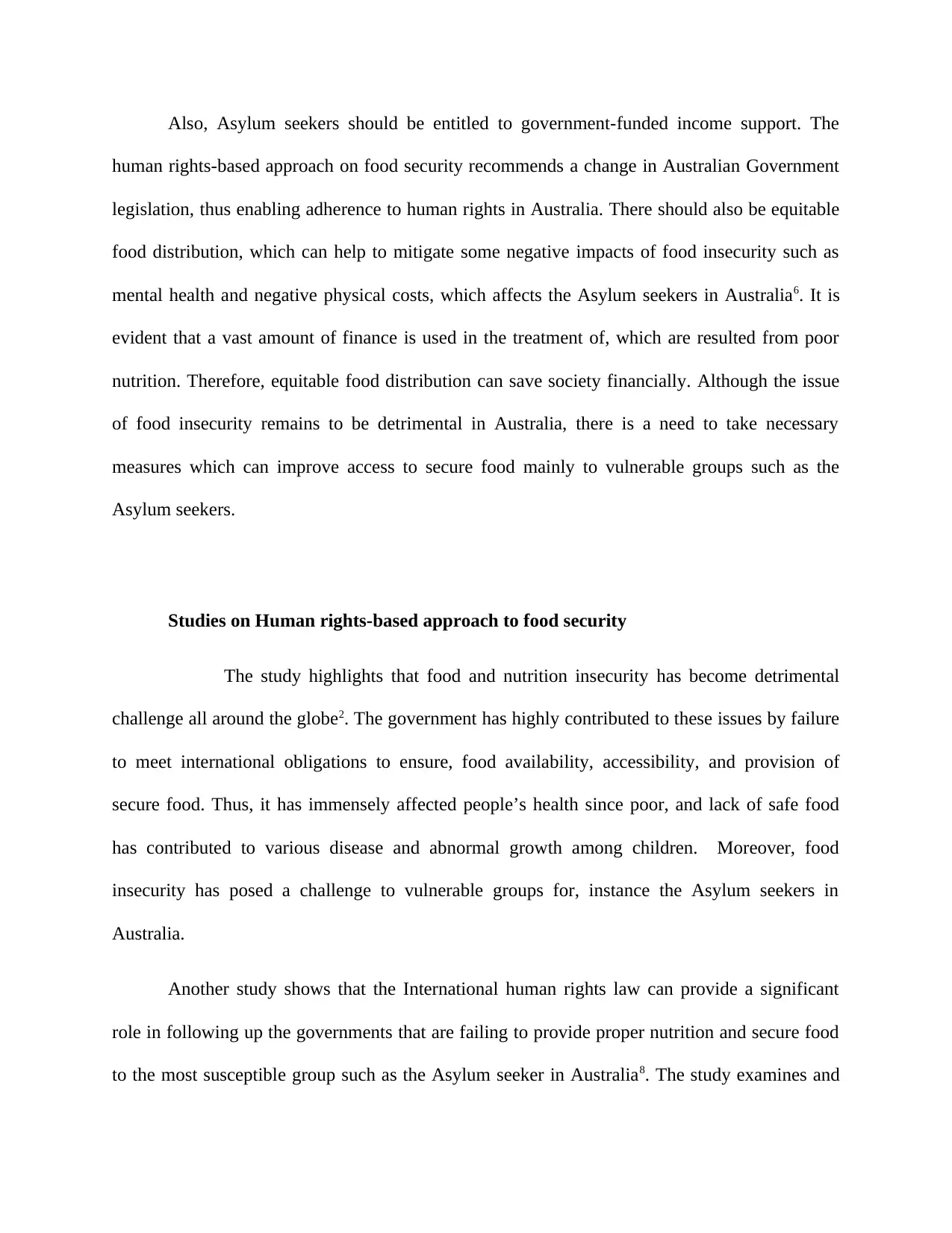
Also, Asylum seekers should be entitled to government-funded income support. The
human rights-based approach on food security recommends a change in Australian Government
legislation, thus enabling adherence to human rights in Australia. There should also be equitable
food distribution, which can help to mitigate some negative impacts of food insecurity such as
mental health and negative physical costs, which affects the Asylum seekers in Australia6. It is
evident that a vast amount of finance is used in the treatment of, which are resulted from poor
nutrition. Therefore, equitable food distribution can save society financially. Although the issue
of food insecurity remains to be detrimental in Australia, there is a need to take necessary
measures which can improve access to secure food mainly to vulnerable groups such as the
Asylum seekers.
Studies on Human rights-based approach to food security
The study highlights that food and nutrition insecurity has become detrimental
challenge all around the globe2. The government has highly contributed to these issues by failure
to meet international obligations to ensure, food availability, accessibility, and provision of
secure food. Thus, it has immensely affected people’s health since poor, and lack of safe food
has contributed to various disease and abnormal growth among children. Moreover, food
insecurity has posed a challenge to vulnerable groups for, instance the Asylum seekers in
Australia.
Another study shows that the International human rights law can provide a significant
role in following up the governments that are failing to provide proper nutrition and secure food
to the most susceptible group such as the Asylum seeker in Australia8. The study examines and
human rights-based approach on food security recommends a change in Australian Government
legislation, thus enabling adherence to human rights in Australia. There should also be equitable
food distribution, which can help to mitigate some negative impacts of food insecurity such as
mental health and negative physical costs, which affects the Asylum seekers in Australia6. It is
evident that a vast amount of finance is used in the treatment of, which are resulted from poor
nutrition. Therefore, equitable food distribution can save society financially. Although the issue
of food insecurity remains to be detrimental in Australia, there is a need to take necessary
measures which can improve access to secure food mainly to vulnerable groups such as the
Asylum seekers.
Studies on Human rights-based approach to food security
The study highlights that food and nutrition insecurity has become detrimental
challenge all around the globe2. The government has highly contributed to these issues by failure
to meet international obligations to ensure, food availability, accessibility, and provision of
secure food. Thus, it has immensely affected people’s health since poor, and lack of safe food
has contributed to various disease and abnormal growth among children. Moreover, food
insecurity has posed a challenge to vulnerable groups for, instance the Asylum seekers in
Australia.
Another study shows that the International human rights law can provide a significant
role in following up the governments that are failing to provide proper nutrition and secure food
to the most susceptible group such as the Asylum seeker in Australia8. The study examines and
⊘ This is a preview!⊘
Do you want full access?
Subscribe today to unlock all pages.

Trusted by 1+ million students worldwide
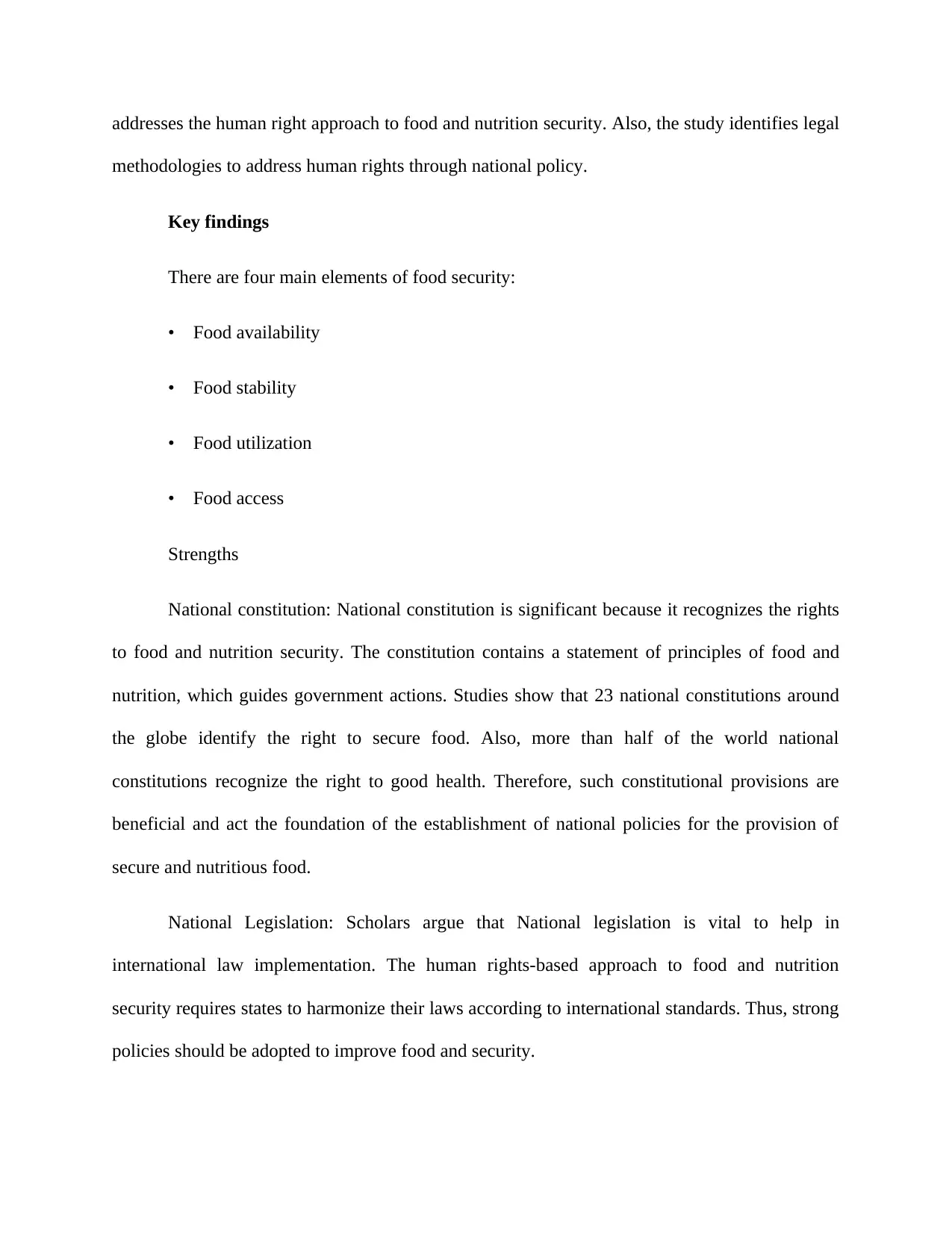
addresses the human right approach to food and nutrition security. Also, the study identifies legal
methodologies to address human rights through national policy.
Key findings
There are four main elements of food security:
• Food availability
• Food stability
• Food utilization
• Food access
Strengths
National constitution: National constitution is significant because it recognizes the rights
to food and nutrition security. The constitution contains a statement of principles of food and
nutrition, which guides government actions. Studies show that 23 national constitutions around
the globe identify the right to secure food. Also, more than half of the world national
constitutions recognize the right to good health. Therefore, such constitutional provisions are
beneficial and act the foundation of the establishment of national policies for the provision of
secure and nutritious food.
National Legislation: Scholars argue that National legislation is vital to help in
international law implementation. The human rights-based approach to food and nutrition
security requires states to harmonize their laws according to international standards. Thus, strong
policies should be adopted to improve food and security.
methodologies to address human rights through national policy.
Key findings
There are four main elements of food security:
• Food availability
• Food stability
• Food utilization
• Food access
Strengths
National constitution: National constitution is significant because it recognizes the rights
to food and nutrition security. The constitution contains a statement of principles of food and
nutrition, which guides government actions. Studies show that 23 national constitutions around
the globe identify the right to secure food. Also, more than half of the world national
constitutions recognize the right to good health. Therefore, such constitutional provisions are
beneficial and act the foundation of the establishment of national policies for the provision of
secure and nutritious food.
National Legislation: Scholars argue that National legislation is vital to help in
international law implementation. The human rights-based approach to food and nutrition
security requires states to harmonize their laws according to international standards. Thus, strong
policies should be adopted to improve food and security.
Paraphrase This Document
Need a fresh take? Get an instant paraphrase of this document with our AI Paraphraser
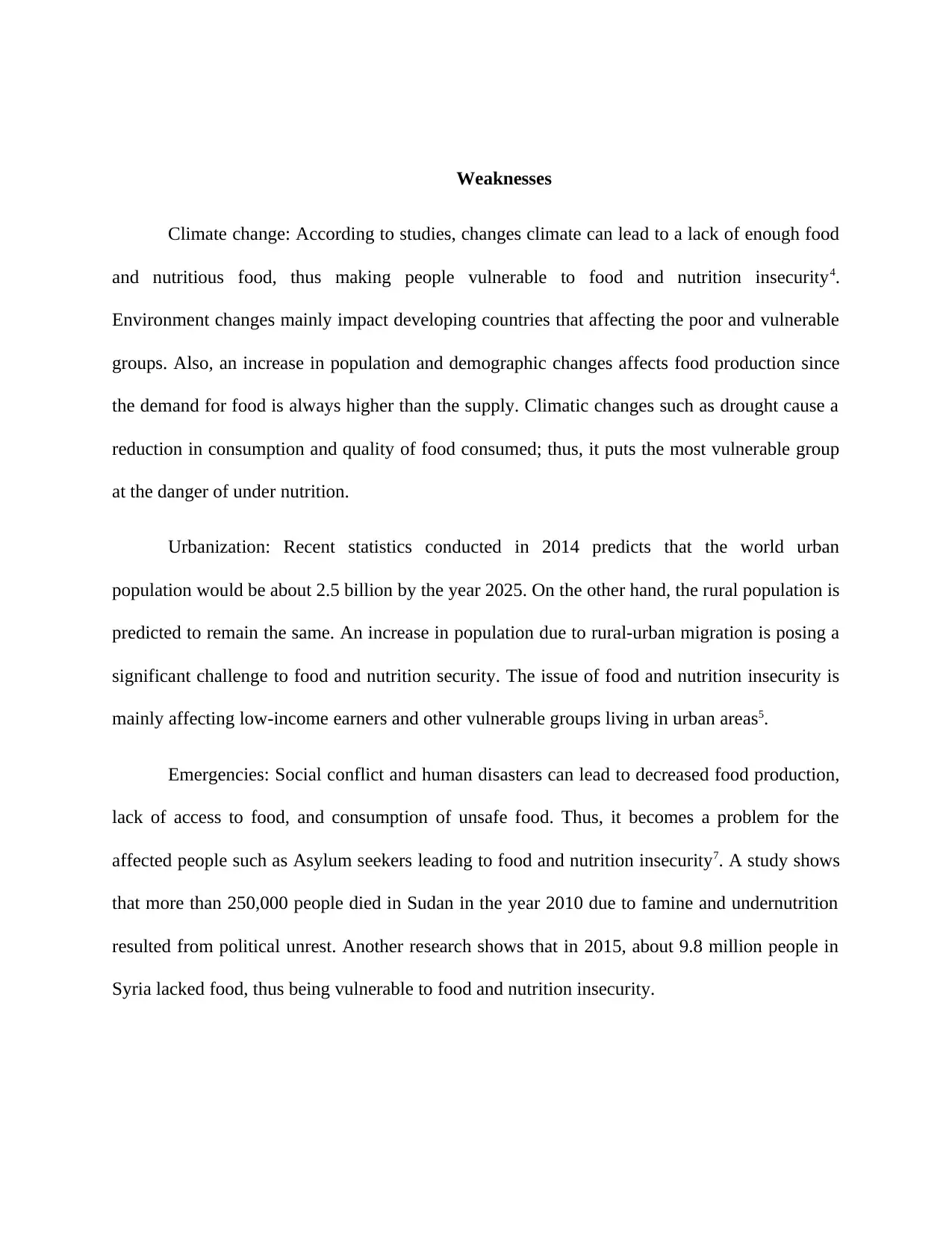
Weaknesses
Climate change: According to studies, changes climate can lead to a lack of enough food
and nutritious food, thus making people vulnerable to food and nutrition insecurity4.
Environment changes mainly impact developing countries that affecting the poor and vulnerable
groups. Also, an increase in population and demographic changes affects food production since
the demand for food is always higher than the supply. Climatic changes such as drought cause a
reduction in consumption and quality of food consumed; thus, it puts the most vulnerable group
at the danger of under nutrition.
Urbanization: Recent statistics conducted in 2014 predicts that the world urban
population would be about 2.5 billion by the year 2025. On the other hand, the rural population is
predicted to remain the same. An increase in population due to rural-urban migration is posing a
significant challenge to food and nutrition security. The issue of food and nutrition insecurity is
mainly affecting low-income earners and other vulnerable groups living in urban areas5.
Emergencies: Social conflict and human disasters can lead to decreased food production,
lack of access to food, and consumption of unsafe food. Thus, it becomes a problem for the
affected people such as Asylum seekers leading to food and nutrition insecurity7. A study shows
that more than 250,000 people died in Sudan in the year 2010 due to famine and undernutrition
resulted from political unrest. Another research shows that in 2015, about 9.8 million people in
Syria lacked food, thus being vulnerable to food and nutrition insecurity.
Climate change: According to studies, changes climate can lead to a lack of enough food
and nutritious food, thus making people vulnerable to food and nutrition insecurity4.
Environment changes mainly impact developing countries that affecting the poor and vulnerable
groups. Also, an increase in population and demographic changes affects food production since
the demand for food is always higher than the supply. Climatic changes such as drought cause a
reduction in consumption and quality of food consumed; thus, it puts the most vulnerable group
at the danger of under nutrition.
Urbanization: Recent statistics conducted in 2014 predicts that the world urban
population would be about 2.5 billion by the year 2025. On the other hand, the rural population is
predicted to remain the same. An increase in population due to rural-urban migration is posing a
significant challenge to food and nutrition security. The issue of food and nutrition insecurity is
mainly affecting low-income earners and other vulnerable groups living in urban areas5.
Emergencies: Social conflict and human disasters can lead to decreased food production,
lack of access to food, and consumption of unsafe food. Thus, it becomes a problem for the
affected people such as Asylum seekers leading to food and nutrition insecurity7. A study shows
that more than 250,000 people died in Sudan in the year 2010 due to famine and undernutrition
resulted from political unrest. Another research shows that in 2015, about 9.8 million people in
Syria lacked food, thus being vulnerable to food and nutrition insecurity.
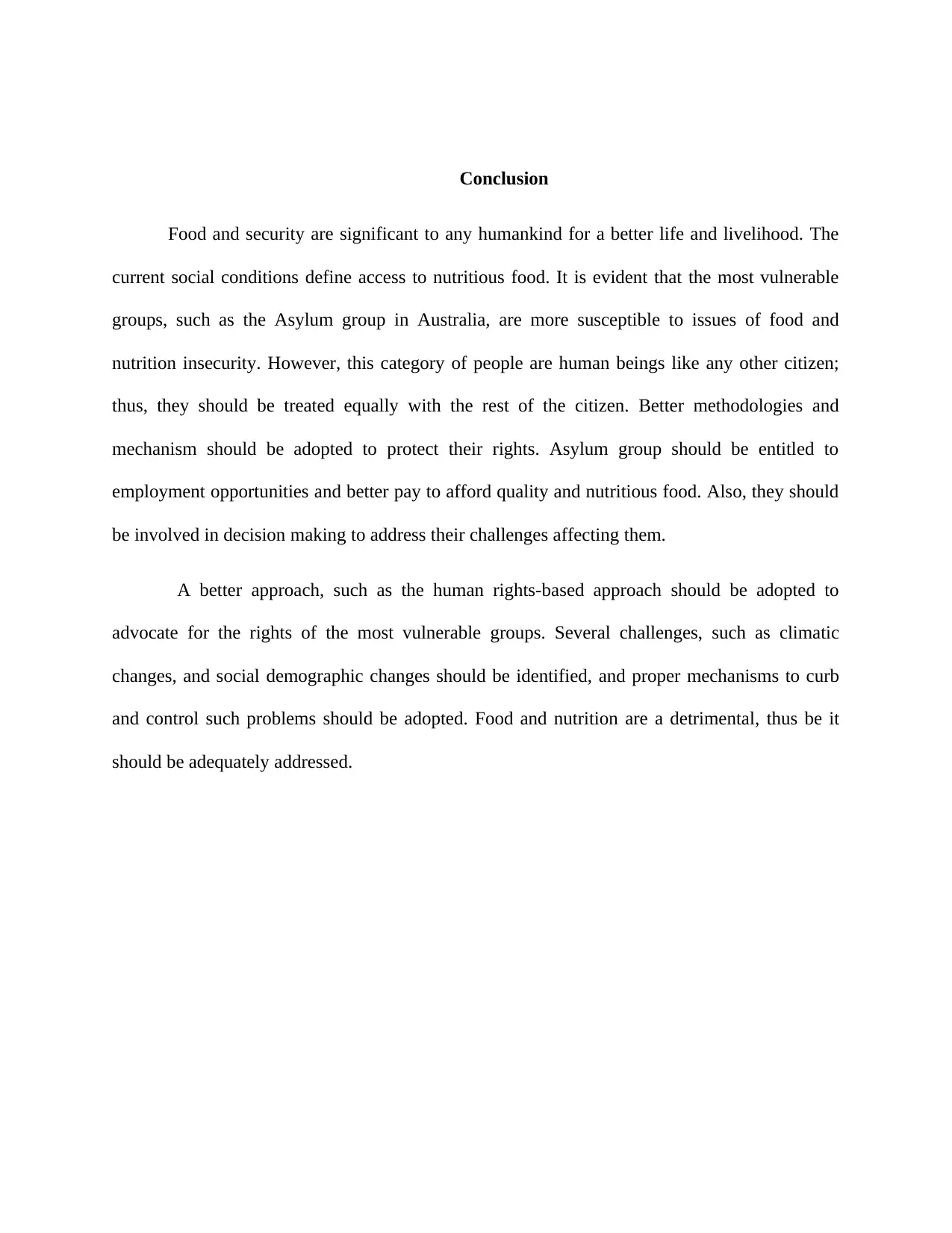
Conclusion
Food and security are significant to any humankind for a better life and livelihood. The
current social conditions define access to nutritious food. It is evident that the most vulnerable
groups, such as the Asylum group in Australia, are more susceptible to issues of food and
nutrition insecurity. However, this category of people are human beings like any other citizen;
thus, they should be treated equally with the rest of the citizen. Better methodologies and
mechanism should be adopted to protect their rights. Asylum group should be entitled to
employment opportunities and better pay to afford quality and nutritious food. Also, they should
be involved in decision making to address their challenges affecting them.
A better approach, such as the human rights-based approach should be adopted to
advocate for the rights of the most vulnerable groups. Several challenges, such as climatic
changes, and social demographic changes should be identified, and proper mechanisms to curb
and control such problems should be adopted. Food and nutrition are a detrimental, thus be it
should be adequately addressed.
Food and security are significant to any humankind for a better life and livelihood. The
current social conditions define access to nutritious food. It is evident that the most vulnerable
groups, such as the Asylum group in Australia, are more susceptible to issues of food and
nutrition insecurity. However, this category of people are human beings like any other citizen;
thus, they should be treated equally with the rest of the citizen. Better methodologies and
mechanism should be adopted to protect their rights. Asylum group should be entitled to
employment opportunities and better pay to afford quality and nutritious food. Also, they should
be involved in decision making to address their challenges affecting them.
A better approach, such as the human rights-based approach should be adopted to
advocate for the rights of the most vulnerable groups. Several challenges, such as climatic
changes, and social demographic changes should be identified, and proper mechanisms to curb
and control such problems should be adopted. Food and nutrition are a detrimental, thus be it
should be adequately addressed.
⊘ This is a preview!⊘
Do you want full access?
Subscribe today to unlock all pages.

Trusted by 1+ million students worldwide
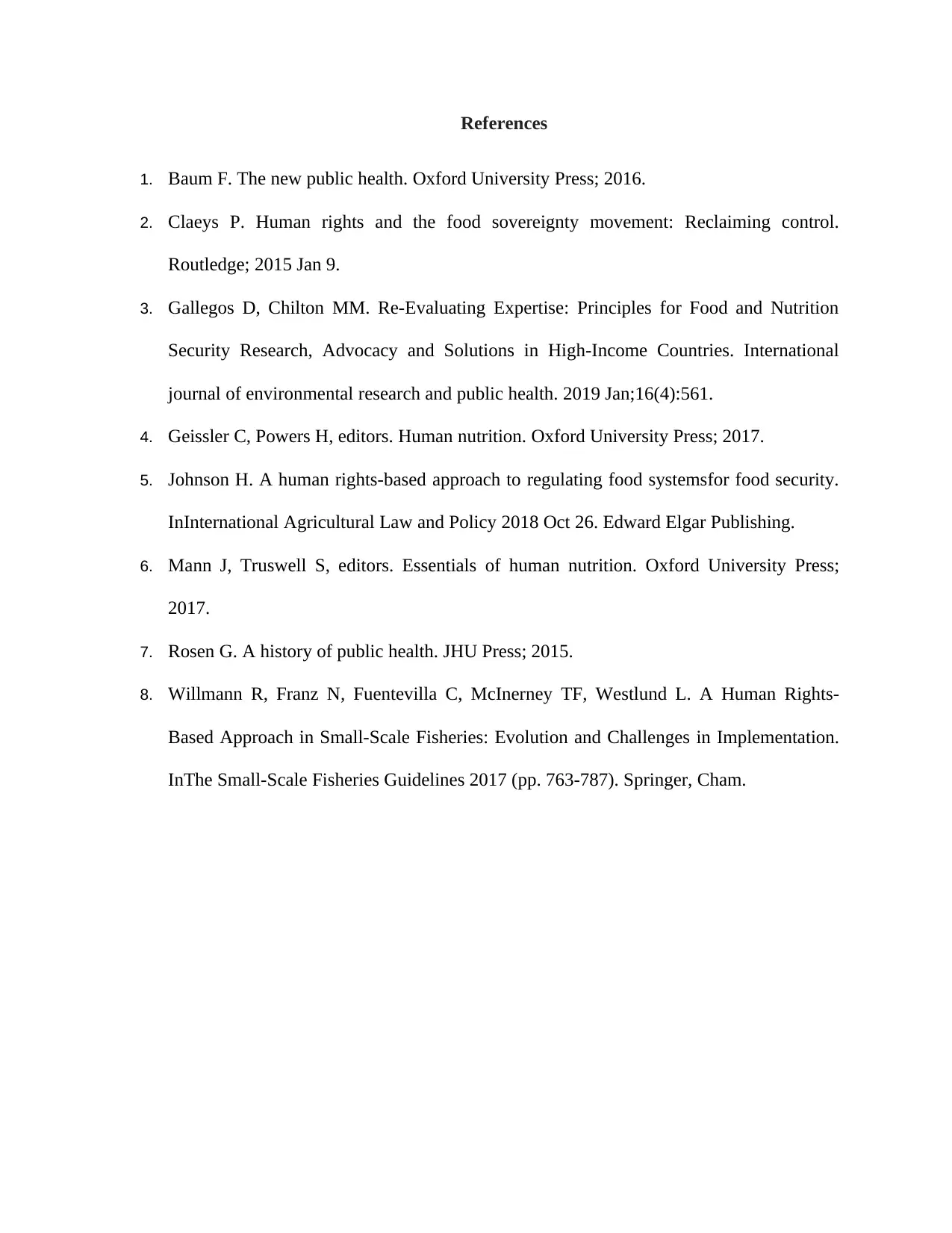
References
1. Baum F. The new public health. Oxford University Press; 2016.
2. Claeys P. Human rights and the food sovereignty movement: Reclaiming control.
Routledge; 2015 Jan 9.
3. Gallegos D, Chilton MM. Re-Evaluating Expertise: Principles for Food and Nutrition
Security Research, Advocacy and Solutions in High-Income Countries. International
journal of environmental research and public health. 2019 Jan;16(4):561.
4. Geissler C, Powers H, editors. Human nutrition. Oxford University Press; 2017.
5. Johnson H. A human rights-based approach to regulating food systemsfor food security.
InInternational Agricultural Law and Policy 2018 Oct 26. Edward Elgar Publishing.
6. Mann J, Truswell S, editors. Essentials of human nutrition. Oxford University Press;
2017.
7. Rosen G. A history of public health. JHU Press; 2015.
8. Willmann R, Franz N, Fuentevilla C, McInerney TF, Westlund L. A Human Rights-
Based Approach in Small-Scale Fisheries: Evolution and Challenges in Implementation.
InThe Small-Scale Fisheries Guidelines 2017 (pp. 763-787). Springer, Cham.
1. Baum F. The new public health. Oxford University Press; 2016.
2. Claeys P. Human rights and the food sovereignty movement: Reclaiming control.
Routledge; 2015 Jan 9.
3. Gallegos D, Chilton MM. Re-Evaluating Expertise: Principles for Food and Nutrition
Security Research, Advocacy and Solutions in High-Income Countries. International
journal of environmental research and public health. 2019 Jan;16(4):561.
4. Geissler C, Powers H, editors. Human nutrition. Oxford University Press; 2017.
5. Johnson H. A human rights-based approach to regulating food systemsfor food security.
InInternational Agricultural Law and Policy 2018 Oct 26. Edward Elgar Publishing.
6. Mann J, Truswell S, editors. Essentials of human nutrition. Oxford University Press;
2017.
7. Rosen G. A history of public health. JHU Press; 2015.
8. Willmann R, Franz N, Fuentevilla C, McInerney TF, Westlund L. A Human Rights-
Based Approach in Small-Scale Fisheries: Evolution and Challenges in Implementation.
InThe Small-Scale Fisheries Guidelines 2017 (pp. 763-787). Springer, Cham.
1 out of 10
Related Documents
Your All-in-One AI-Powered Toolkit for Academic Success.
+13062052269
info@desklib.com
Available 24*7 on WhatsApp / Email
![[object Object]](/_next/static/media/star-bottom.7253800d.svg)
Unlock your academic potential
Copyright © 2020–2026 A2Z Services. All Rights Reserved. Developed and managed by ZUCOL.





